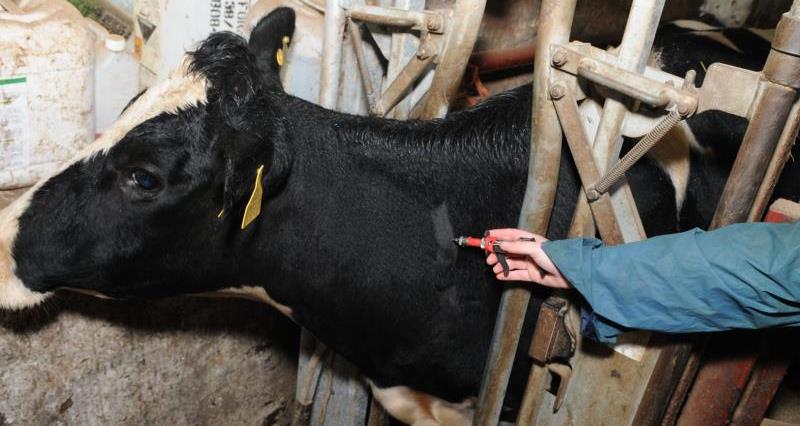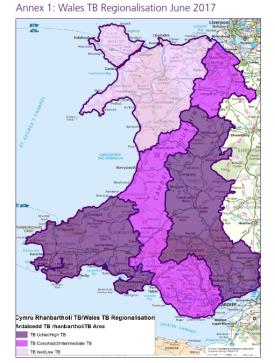From the 1st October 2017, Low, Intermediate and High TB Areas are to be established in Wales based on bovine TB incidence levels. Enhanced measures have been applied in each TB Area tailored to protect the Low TB Area and reduce the disease in the Intermediate and High TB Areas.
Key changes
Post-Movement Testing (PoMT) in the Low and Intermediate TB Areas
What is changing?
From 1 October 2017, all cattle moved into the Low TB Area will require a PoMT. This includes any cattle moved from the High Risk and Edge Areas in England. Following review, the intention is to extend this policy to the Intermediate TB Areas in October 2018.
Pre-Movement Testing (PrMT) in the Low TB Area
What is changing?
From 1 October 2017 PrMT will not be required for cattle moved within or from the Low TB Area. PrMT will continue to be required for cattle moved within, between or from the Intermediate and High TB Areas.
Clearing test in chronic TB herd breakdowns
What is changing?
From 1 October 2017 in chronic (persistent and recurrent) herd breakdowns, the clearing test will no longer be able to be used as a Pre-Movement Test.
Inconclusive Reactors (IRs) in chronic herd breakdowns
What is changing?
As part of the ongoing Action Plan process, all IRs in chronic herd breakdowns will be slaughtered. Persistent breakdowns will be focussed on initially. Further consideration will be given to the wider policy of dealing with IRs.
Compensation for within herd movements in chronic herd breakdowns
What is changing?
In chronic herd TB breakdowns, but focussing on persistent breakdowns initially, where cattle are moved under licence within a CPH, compensation will be reduced to 50% if they are subsequently slaughtered as a result of TB. Farmers will be given appropriate time in order to restructure their holding before this policy takes effect and implementation will vary according to the status of a breakdown.:
New breakdowns. From 1 October, at the beginning of a TB breakdown, farmers will be informed that the policy will be implemented if the herd becomes persistent (i.e. after 18 months under restriction).
For existing persistent breakdowns, farmers will be informed that compensation reduction will apply from 1 April 2018. However, they may be given a period of up to 12 months to make changes before the policy fully applies, for example if this involves the erection of a new building.
Breakdowns that become persistent after 1 October will be given six months before compensation reduction applies (or up to 12 months in line with the above).
Compensation Cap
What is changing?
From 1 October 2017 the current £15,000 cap on TB compensation payable per animal will be reduced to £5,000. Further analysis will be undertaken on alternative approaches to compensation in Wales.
Exempt Finishing Units (EFUs)
These will be phased out by 1st January 2018
Biosecurity Requirements Notices (BRNs)
What is changing?
As part of the ongoing Action Plan process, BRNs will be issued as necessary to OTFW chronic breakdown herds and compensation will be reduced in cases of non-compliance. Persistent breakdowns will be focussed on initially. Standardised biosecurity guidance will be made available to all farmers.
Wildlife
Where infected animals are found, either cattle or badgers, it is reasonable and proportionate to remove them as possible sources of infection to break the cycle of transmission. Interventions will be monitored closely and adapted if necessary.
What is changing?
• A Badger Found Dead Survey will continue across Wales.
• The Welsh Government will continue to assess the most appropriate deployment of the Badger BCG vaccine if and when it becomes available.
• As part of the ongoing Action Plan process, where the Welsh Government views that badgers are contributing to the persistence of disease in chronic herd breakdowns, badgers will be trapped and tested on the breakdown farm and test positive badgers will be humanely killed. Persistent herd breakdowns will be focussed on initially.
Dealing with chronic herd breakdowns
Chronic herd breakdowns encompass those which have been under TB restrictions for 18 months or longer and herds that suffer recurrent breakdowns. Action Plans will be bespoke to the farm in question and will be developed in partnership with the farmer, vet and APHA.
As an initial stage, Action Plans will be developed for persistent herd breakdowns (those lasting 18 months or longer). It is anticipated that, in due course, development of Action Plans will be extended to recurrent breakdowns. Currently all chronic herd breakdowns are located in the Intermediate and High TB Areas.
Communications
The Welsh Government is committed to meeting regularly with stakeholders during the course of the first year of implementation.
APHA can provide further detailed information on what these changes mean for you. APHA can be contacted on 0300 303 8268
The Welsh Government will continue to work closely with other Government administrations, particularly Defra, to ensure a joined up approach where it is appropriate.
Regionalised Map

